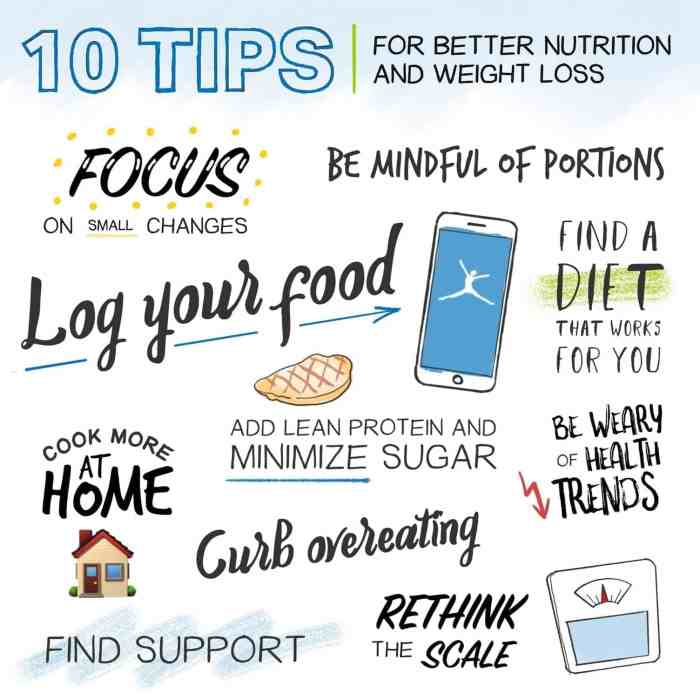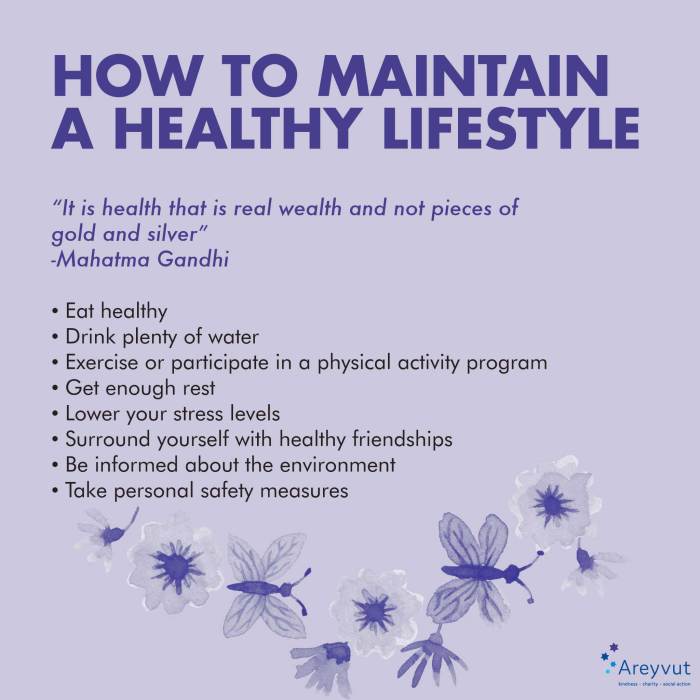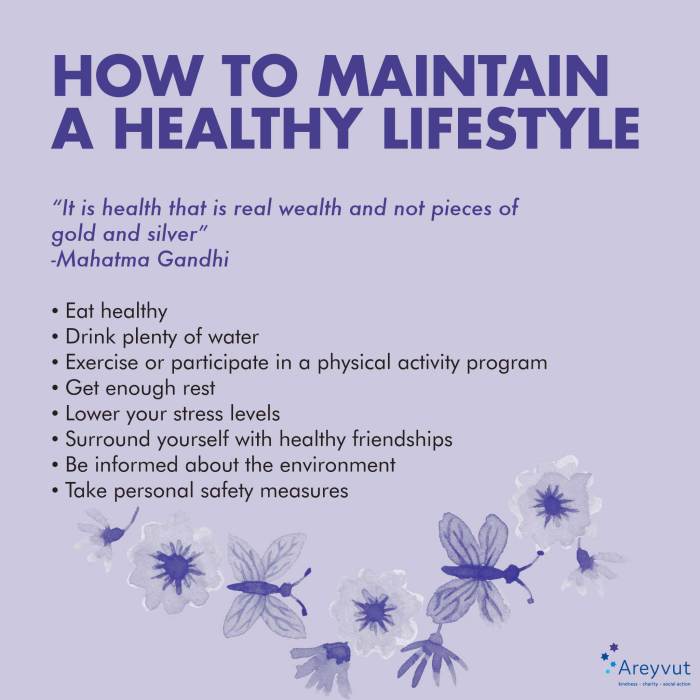Healthy Lifestyle Tips: Ready to level up your wellness game? Buckle up as we dive into key strategies for a healthier and happier life.
From nutrition to exercise, stress management to sleep habits, we’ve got you covered with expert advice and practical tips. Let’s get started!
Importance of Healthy Lifestyle
Maintaining a healthy lifestyle is crucial for overall well-being. It involves making choices that promote a healthy body and mind, leading to a better quality of life. By adopting healthy habits, individuals can experience a range of benefits that positively impact their physical and mental health.
Benefits of Healthy Habits
- Improved Physical Health: Regular exercise, balanced nutrition, and proper hydration can boost energy levels, strengthen the immune system, and reduce the risk of various illnesses.
- Enhanced Mental Health: Engaging in activities that promote relaxation and stress management, such as meditation or yoga, can improve mental clarity, mood, and overall well-being.
- Reduced Risk of Chronic Diseases: Following a healthy lifestyle can lower the chances of developing chronic conditions like heart disease, diabetes, and obesity, leading to a longer and healthier life.
- Increased Longevity: By prioritizing healthy habits and taking care of the body, individuals are more likely to live longer and enjoy a higher quality of life as they age.
Nutrition and Diet: Healthy Lifestyle Tips

Eating a balanced diet is crucial for maintaining a healthy lifestyle as it provides the necessary nutrients for the body to function optimally. A well-rounded diet can help prevent chronic diseases, boost energy levels, improve mood, and support overall well-being.
Examples of Nutrient-Rich Foods
- Fruits and vegetables: Rich in vitamins, minerals, and antioxidants that support immune function and reduce the risk of chronic diseases.
- Whole grains: Provide fiber, B vitamins, and minerals essential for digestion and heart health.
- Lean proteins: Sources like poultry, fish, tofu, and legumes are important for muscle growth, repair, and overall body function.
- Dairy or dairy alternatives: Calcium-rich foods like milk, yogurt, and fortified plant-based milks are essential for bone health.
Impact of Unhealthy Eating Habits
Unhealthy eating habits, such as consuming excessive processed foods, sugary beverages, and high-fat snacks, can have detrimental effects on the body and mind. These habits can lead to weight gain, nutrient deficiencies, increased risk of chronic diseases like diabetes and heart disease, decreased energy levels, and poor mental health. It is important to prioritize nutrient-dense foods and limit the intake of unhealthy options to maintain a healthy lifestyle.
Physical Activity and Exercise

Regular physical activity plays a crucial role in maintaining a healthy lifestyle. It not only helps in weight management but also improves muscle strength and cardiovascular health.
Types of Exercises
- Cardiovascular Exercises: These include activities like running, swimming, and cycling that elevate your heart rate and help improve your cardiovascular health.
- Strength Training: Involves lifting weights or using resistance bands to build muscle strength and endurance.
- Flexibility Exercises: Stretching exercises like yoga or Pilates help improve flexibility and prevent injuries.
- Balance Exercises: These exercises, such as tai chi or stability ball workouts, help enhance balance and reduce the risk of falls, especially in older adults.
Benefits of Exercise, Healthy Lifestyle Tips
- Weight Management: Regular exercise helps burn calories, leading to weight loss or maintenance.
- Muscle Strength: Strength training exercises help build and maintain muscle mass, which is essential for overall strength and function.
- Cardiovascular Health: Cardio exercises improve heart health by strengthening the heart muscle and improving circulation.
Mental Health and Stress Management
Maintaining good mental health is crucial for overall well-being. It impacts how we think, feel, and act, influencing how we handle stress, relate to others, and make choices. Stress is a common factor that can negatively affect mental health, leading to various issues if not managed properly. Learning effective strategies to manage stress and build mental resilience is essential for a healthy lifestyle.
Strategies for Managing Stress
- Acknowledge stress triggers and try to identify patterns in your stress response.
- Practice relaxation techniques such as deep breathing, meditation, or yoga to calm the mind.
- Engage in regular physical activity to release endorphins and reduce stress levels.
- Establish a support system by reaching out to friends, family, or a therapist for guidance and emotional support.
- Set realistic goals and prioritize tasks to avoid feeling overwhelmed.
Connection between Mental Health and Physical Health
- Poor mental health can lead to physical health issues such as weakened immune system, cardiovascular problems, and digestive disorders.
- Conversely, maintaining good mental health can enhance physical well-being, improve sleep quality, and boost immune function.
- Positive mental health contributes to better overall quality of life, leading to increased productivity, stronger relationships, and a sense of fulfillment.
Sleep Habits and Hydration
Adequate sleep and staying hydrated are crucial aspects of maintaining a healthy lifestyle. Let’s dive into the impact of sleep habits and hydration on our overall well-being.
The Importance of Adequate Sleep
Getting enough sleep is essential for our physical and mental health. Lack of sleep can lead to a variety of health issues, including weakened immune system, weight gain, and increased risk of chronic diseases. To improve sleep quality, try to establish a consistent sleep schedule, create a relaxing bedtime routine, and ensure your sleep environment is comfortable and conducive to rest.
Tips for Healthy Sleep Habits
- Avoid caffeine and electronic devices before bedtime.
- Engage in regular physical activity during the day.
- Avoid large meals close to bedtime.
- Practice relaxation techniques like deep breathing or meditation.
- Limit naps during the day to improve nighttime sleep.
The Importance of Staying Hydrated
Staying hydrated is vital for maintaining optimal bodily functions. Water plays a crucial role in regulating body temperature, aiding digestion, and transporting nutrients throughout the body. Dehydration can lead to fatigue, headaches, and decreased cognitive function. Make sure to drink an adequate amount of water throughout the day to stay hydrated and energized.
Social Connections and Relationships
Building and maintaining social connections and meaningful relationships are crucial aspects of promoting a healthy lifestyle. Positive relationships play a significant role in supporting mental and emotional well-being by providing a sense of belonging, support, and companionship.
Role of Social Interactions
Social interactions involve engaging with others in various settings, such as friends, family, colleagues, or community groups. These interactions can positively impact mental health by reducing feelings of loneliness, stress, and depression. Building strong social connections can also improve self-esteem and overall life satisfaction.
Building and Maintaining Meaningful Relationships
- Make time for regular communication and quality interactions with loved ones.
- Show empathy, active listening, and support towards others to strengthen relationships.
- Engage in shared activities or hobbies to foster bonds and create lasting memories.
- Resolve conflicts through effective communication and compromise to maintain healthy relationships.
Positive Relationships for Mental and Emotional Well-being
- Positive relationships can provide emotional support during difficult times and celebrate successes together.
- Feeling connected to others can boost feelings of happiness, reduce anxiety, and improve overall mental health.
- Sharing experiences, thoughts, and emotions with trusted individuals can promote a sense of security and understanding.
Healthy Habits for Daily Life
Incorporating healthy habits into your daily routine is essential for overall well-being. By focusing on meal planning, exercise scheduling, and self-care practices, you can ensure that you are taking care of your body and mind on a consistent basis.
Meal Planning
Planning your meals ahead of time can help you make healthier choices throughout the day. Try creating a weekly meal plan that includes a balance of fruits, vegetables, lean proteins, and whole grains. This can save you time and money while also promoting a nutritious diet.
Exercise Scheduling
Scheduling regular exercise sessions into your daily routine is crucial for maintaining a healthy lifestyle. Whether it’s a morning jog, a yoga class, or a quick workout at home, find activities that you enjoy and stick to a consistent schedule to stay active.
Self-Care Practices
Taking care of your mental health is just as important as taking care of your physical health. Incorporate self-care practices such as meditation, journaling, or spending time outdoors to reduce stress and improve overall well-being. Remember to prioritize yourself and make time for activities that bring you joy.
Consistency and Perseverance
Consistency is key when it comes to maintaining healthy habits. Make small changes to your routine and stick to them over time to see lasting results. Remember that progress takes time, so be patient with yourself and stay committed to your health goals.
